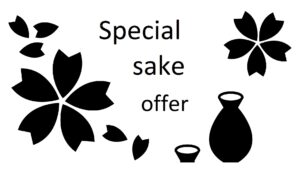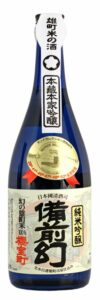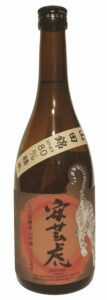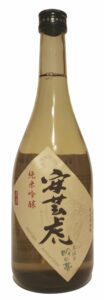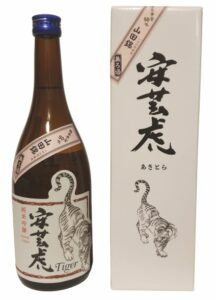Our special offer includes Japanese sake from different sake breweries around Japan and we are proud to present them to our customers. From breweries listed below, we have chosen interesting sake, which we like and we think that Czech consumers will appreciate them. This offer of sake is complementing our permanent offer from Ile Four and Itano Shuzo. You will also find a brief profile of each manufacturer, and after clicking on the bottle you will be redirected to our e-shop for the relevant product.
Currently you can find sake from Sakura Muromachi (pref. Okayama), Shimizu Seizaburo Shoten (pref. Mie) and Arimitsu (pref. Kochi – Shikoku Island).
Muromachi Shuzo
The history of this sake brewery dates back to 1688, when Juemon Hanafusa started brewing sake from the excess rice. The Hanafusa family continues the tradition of sake production to this day. The companys current president is Mitsuru Hanafusa, who has decided to use local Omachi rice. It is grown in the Seto region of Okayama Prefecture and is taken from local growers to reflect the terroir in the sake it produces. At the same time, this rice adds sake earthiness.
Bizen Maboroshi Junmai Ginjo
This Junmai Ginjo has been awarded medals such as the Monde Selection Gold Award for three consecutive years. Omachi rice is used for production. This variety belongs to the original rice varieties, which are not cross bred. The grains are milled to 60%. The aroma is fruity, especially pears and sweet rice. The taste is dry and full.
We recommend pairing it with fish or shrimp or Camembert cheese with pear chutney.
We recommend serving Bizen Maboroshi Junmai Ginjo chilled.
Shimizu Seizaburo Shoten
Located in Suzuka, Mie Prefecture, Shimizu Seizaburo Shoten is a well-known and acclaimed sake brewery whose sake is at the top of competitions such as Kura Master and more. It was founded in 1869 by Mr. Seizaburo Shimizu and has been producing sake here using traditional methods. This is a medium sake brewery with an annual production of 900hl. Interestingly, the fermentation time is 30 days or more, which is unusually long. At the same time, they use smaller fermentation tanks, according to them, the conditions are better controlled in these vats. In our offer you will find products from their “Zaku” line, which is a character reading that means “to create” or “to produce”.
Zaku - Ho no Tomo - Junmai
Zaku – Ho no Tomo has a meaning. The sign Ho (穂) can be loosely translated as “grain of rice”. The sign Tomo (智) is translated as wisdom or knowledge and the sign No is a conjunction. The whole name can therefore be loosely translated as “knowledge of rice”. This is a Junmai-type sake, the production of which uses local rice, which is milled to 60%. It gives freshness, fruity aroma and lightness to this unique sake.
When pairing with food, there is no need to worry about the combination with well aged beef.
We recommend serving Zaku – Ho no Tomo chilled or you can mix refreshing cocktails from it.
Zaku - Miyabi no Tomo - Junmai Ginjo
Even Zaku – Miyabi no Tomo has its own translation from Japanese. It can be loosely translated as “knowledge of smoothness (fineness)”. The rice is milled to 50% and it is Junmai Ginjo. In the aroma you can find traces of lilac and daffodils in combination with fresh and ripe Asian pears and melons. All these elements go hand in hand with wonderful elegance. The taste again shows these floral tones and a slight sweetness that adds structure.
Zaku – Miyabi no Tomo Junmai Ginjo goes well with lighter fish dishes and seafood. We recommend serving chilled.
Arimitsu Shoten
This small sake brewery is located in Kochi Prefecture on the south coast of Shikoku Island. Speaking of size, the annual production is only 600hl. Arimitsu Shoten was founded in 1903 on the site of another sake brewery, which has been there for more than two hundred years. Although this area is known for its dry sake, not all sake produced in Arimitsu Shoten adheres to it. They do want to produce original sake here and follow traditional methods. Maybe that’s why their motto is: “brewing sake requires time and a lot of care (effort)”. The goal is to make their sake the one you want to drink with friends on a relaxing evening.
Akitora - Junmai
Akitora - Junmai Ginjo - Gin no Yume
This Junmai Ginjo is made from the local Gin no Yume rice variety, which is also used by other sake breweries from Shikoku Island. The seeds are milled to 50% to reveal the core of the grains, which gives the sake its purity of taste. Although this could push it to a Daiginjo category, the toji wants to shows that its Daiginjo will be much better.
The aroma has tones of tropical fruits and bananas. The taste is harmonic. We recommend serving chilled.
Akitora - Junmai Ginjo - Yamada Nishiki
Yamada Nishiki milled to 50% forms the basis of this dry Junmai Ginjo. The aroma contains tropical fruits. The taste is pleasantly fruity and there is harmony in balance between sweetness and acidity.
We recommend pairing it with white fish sashimi or shrimp, for example.
Akitora Junmai Ginjo is recommended to be served chilled.
